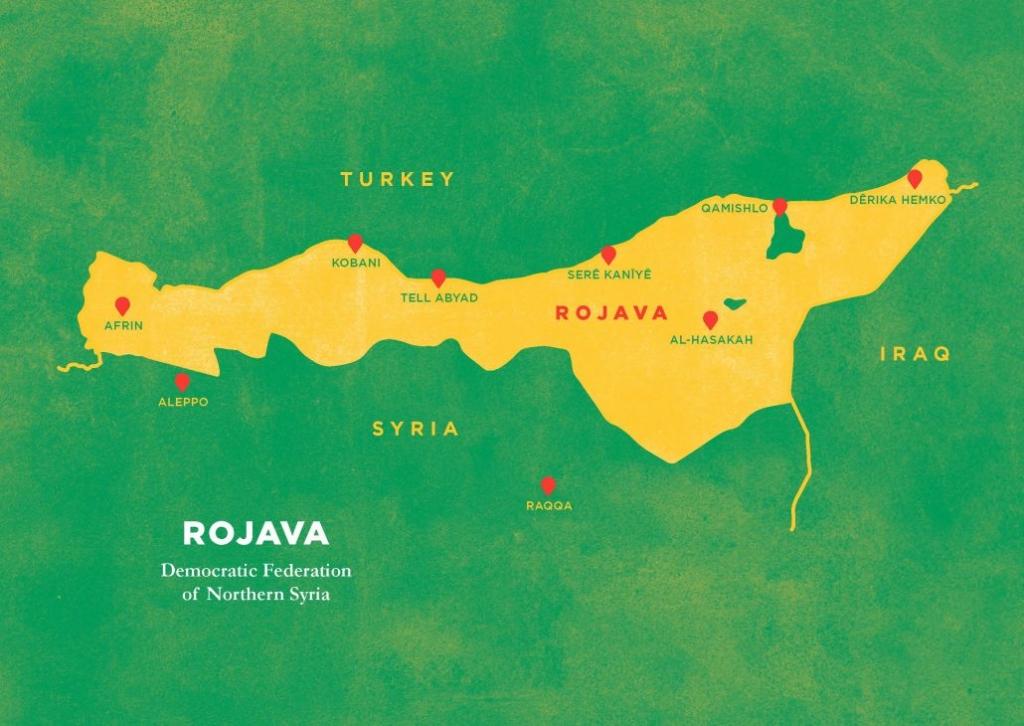Statement of the Internationalist Commune on the Agreement between self-administration and the Syrian state.
After the democratic Autonomous Administration of North and East Syria managed to conclude a military agreement with the forces of the Syrian regime on October 13, the military-political situation on the ground has gained some complexity. Countless speculations and deliberately dispersed misinformation circulate on social media and are also spread through the major news agencies. They cause uncertainty and confusion in the global resistance movement. It is therefore important to take a look at the facts on the ground.
Already in the night of October 13 to 14, first reports spread quickly that units of the Syrian Arab Army (SAA) had entered the liberated areas of northeastern Syria. Images in the Syrian state media suggested that the troops had taken complete control of the cities of Tebqa, Raqqa, Hasakeh and Til Temir. However, the troops of the central Syrian state only took positions in Ayn Issa south of Kobane and in Til Temir south of Serekaniye. The agreement, reached after long negotiations, provides that the government forces, as the regular armed forces of the Syrian state, will take their positions on the northern border of the country and together with the democratic forces of Syria will defend Syria’s sovereignty and unity against Turkish aggression. This is a purely military agreement, and contrary to all speculation, the presence of Syrian government forces will not affect the self-government or internal security forces in the liberated areas. The mission of the Syrian troops remains limited to defending the country together against the Turkish occupation army.
After the last American troops fled in a hurry with the onset of the first Turkish attacks on Manbij, on October 14th and 15th SAA troops took over several points and positioned themselves at the northern and western front of Manbij. However, with the exception of the arrival of the first Syrian soldiers in the city of Kobane, there has been no relocation of Syrian government troops to the border areas threatened by the invasion or even to the more active combat zones. Also, there is currently no presence of Russian military police or the SAA in Manbij. The SAA has positioned itself together with Manbij’s Military Council at the north and west fronts of the city and has assumed no function within the city.
It is important to emphasize that the agreement now being discussed does not represent a swing in the tactical course of the Autonomous Administration, but rather that it is the direct continuation of the movement’s approach to a solution. The strategy of democratic autonomy was never a project of secession from the Syrian central state, but to strive for a solution to the crisis within the democratic unity of all parts of Syria. It has been always emphasized that a solution to Syria’s political crisis, and thus an end to the bloody war, can only be achieved through successful dialogue within Syria. The condition for the long-term return of the Syrian government troops to the territories of the Democratic Federation has always been the constitutional recognition of the Autonomous Administration, of all its local and trans-regional organs, its self-defense forces, as well as the rights of all ethnic and religious groups of Syria.
The urgency of the situation, especially the imminent threat of genocide, made it necessary to take a step towards the regime and invite the government forces to defend Syria together. If the agreement were successfully implemented and the self-defense forces and the SAA succeeded jointly in driving the occupiers out of the country, this would lay the foundation for a further political solution process with Damascus. The agreement would also give the opportunity to expand the fight to the occupied territories west of the Euphrates, i.e. Jarablus, Bab, Azas, Mare and Afrin, which would allow hundreds of thousands of displaced people to return.
It is important to reemphasize once again that nothing changes in the political administration within northeastern Syria with this agreement. The revolution has its own principles, and these are not negotiable; not with the US, Russia or the Syrian regime. The project of a united, democratic-federal and independent Syria will continue to define the course of the dialogue with the central government. With the exception of the official statements of the self-government one should not believe wild speculations. And the agreement does not change anything for the global resistance. The Turkish war of aggression and the resistance against the occupation continues, with or without troops of the regime. Thus, the international solidarity movement should not be diverted from its path and further intensify the resistance.

